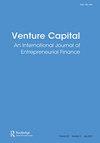重新审视众筹:一个新制度的领域视角
IF 2.3
4区 管理学
Q2 BUSINESS, FINANCE
引用次数: 21
摘要
众筹依赖于许多非制度化个人的金融力量,这些个人承诺小额资金,在文献中被视为一种特别适合的创业融资形式。其中一个原因可能是,投资决策更多地基于企业的价值主张,而不是纯粹的财务因素。然而,在不同的文化和监管背景下,企业价值主张的沟通和翻译需要专业服务和共同努力。这些服务是由所谓的众筹平台(CFPs)实现的,它提供必要的工具和服务。然而,他们也通过他们的行动影响并可能限制该领域。为了更全面地了解结构和代理人之间的相互作用,我们从制度领域的角度出发,在广泛更新文献的基础上,修改了我们2013年在《风险投资》(Venture Capital)上发表的文章中提出的最初模型,并从其他实证案例中提供新的见解,以三角化最近的学术贡献。最后,我们在制度领域层面加强了众筹理论,更好地概念化了参与者与其活动之间的相互联系,以及他们在结构中的地位和联系,以及众筹平台作为强大的中心参与者。本文章由计算机程序翻译,如有差异,请以英文原文为准。
Crowdfunding revisited: a neo-institutional field-perspective
ABSTRACT Crowdfunding, which relies on the aggregated financial power of the many non-institutionalised individuals, who pledge small amounts is seen in the literature as a particularly well-suited form of entrepreneurial finance. A reason for this may be that the investment decisions are more based on the value propositions of a venture than on purely financial factors. Yet, the communication and translation of the value propositions of a venture into various cultural and regulatory contexts requires specialised services and joint efforts. These services are enabled by so-called Crowdfunding Platforms (CFPs) which provide the necessary tools and services. However, they also influence and potentially limit the field through their actions. Applying an institutional field-perspective in order to gain more holistic insights on the interplay between structure and agents, we revise the originally proposed model developed in our 2013 article in Venture Capital based on an extensive update of the literature and provide new insights from additional empirical cases to triangulate the recent scholarly contributions. We finally enhance theory on crowdfunding on an institutional field-level with a better conceptualization of the interconnectedness between actors and their activities, as well as their positions and links within the structure and crowdfunding platforms as powerful central actors.
求助全文
通过发布文献求助,成功后即可免费获取论文全文。
去求助
来源期刊

Venture Capital
BUSINESS, FINANCE-
CiteScore
4.10
自引率
16.70%
发文量
21
期刊介绍:
Venture Capital publishes cutting edge research-based papers from academics and practitioners on all aspects of private equity finance such as: •institutional venture capital •informal venture capital •corporate venture capital •public sector venture capital •community venture capital It also covers all aspects of the venture capital process from investment decision to exit, including studies on: •investment patterns •investment decision-making •investment performance •realisation of investment value exit routes (including the relationship with junior capital markets such as NASDAQ, EASDAQ, AIM and Nouvelle March). •economic impact and public policy
 求助内容:
求助内容: 应助结果提醒方式:
应助结果提醒方式:


